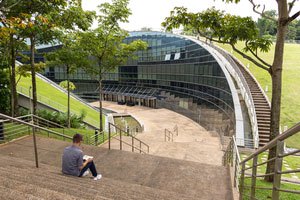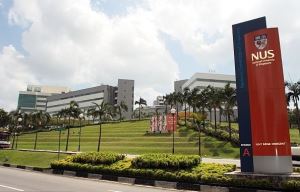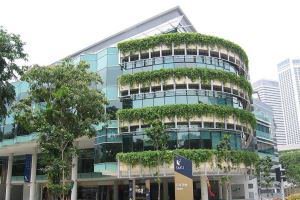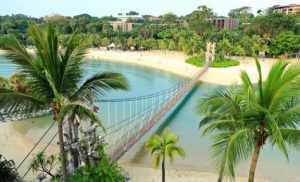
It may be small, but in the realms of higher education and research, Singapore is a big hitter. A whole series of global reports have recognized Singapore as a world leader in research and innovation over the past few decades. In recent years, it’s been ranked seventh in the 2015 INSEAD Global Innovation Index, third in IMD’s 2014 World Competitiveness Rankings and second in the World Economic Forum’s Global Competitiveness Report for 2014-15.
Within this context of global competitiveness and innovation, universities in Singapore are also gaining growing recognition, as Asian nations more generally strengthen their position in the global education market. Singapore’s two leading universities are now both ranked within the world’s top 15, and the city itself is ranked 14th in the QS Best Student Cities 2017, reflecting its combination of educational excellence, high quality of life, and diverse student community.
Universities in Singapore
There are 34 universities in Singapore, of which six are national. The two best-known, the National University of Singapore (NUS) and Nanyang Technological University (NTU) both feature very highly in the QS World University Rankings® 2018, offering courses in a wide range of subjects to their student populations of over 30,000 each.
Nanyang Technological University
 Previously ranked only one place down from NUS, NTU overtook NUS in 2018 to now be Singapore’s highest-ranked university in both the QS World University Rankings® and the QS Asia University Rankings, ranked 11th in the world and first in Asia. NTU is highly regarded for its engineering courses, and in the QS World University Rankings by Subject it’s in the global top five for the broad subject area of engineering & technology, and is also ranked for civil engineering. In recent developments, NTU enrolled the first batch of students at its new Lee Kong Chian School of Medicine in the summer of 2013, as part of a collaborative venture with the UK’s Imperial College London.
Previously ranked only one place down from NUS, NTU overtook NUS in 2018 to now be Singapore’s highest-ranked university in both the QS World University Rankings® and the QS Asia University Rankings, ranked 11th in the world and first in Asia. NTU is highly regarded for its engineering courses, and in the QS World University Rankings by Subject it’s in the global top five for the broad subject area of engineering & technology, and is also ranked for civil engineering. In recent developments, NTU enrolled the first batch of students at its new Lee Kong Chian School of Medicine in the summer of 2013, as part of a collaborative venture with the UK’s Imperial College London.
National University of Singapore
 Singapore’s global superstar, the National University of Singapore (NUS) is currently ranked 15th in the QS World University Rankings, and second in the QS Asia University Rankings 2018. Within the QS World University Rankings by Subject, NUS displays a breadth of high performance which can be rivalled by very few universities in the world. The school is now ranked seventh in the world for the engineering and technology broad subject area, and eighth for chemical engineering. It’s also within the top 10 for social sciences & management.
Singapore’s global superstar, the National University of Singapore (NUS) is currently ranked 15th in the QS World University Rankings, and second in the QS Asia University Rankings 2018. Within the QS World University Rankings by Subject, NUS displays a breadth of high performance which can be rivalled by very few universities in the world. The school is now ranked seventh in the world for the engineering and technology broad subject area, and eighth for chemical engineering. It’s also within the top 10 for social sciences & management.
Trying to decide between NUS and NTU? Read a comparison of these two top universities in Singapore here.
Singapore Management University
 Offering a more specialized range of subjects, Singapore Management University is another of Singapore’s best known institutions, ranking among the world’s leading providers of education in the fields of accounting and finance, computer science, economics, law and statistics.
Offering a more specialized range of subjects, Singapore Management University is another of Singapore’s best known institutions, ranking among the world’s leading providers of education in the fields of accounting and finance, computer science, economics, law and statistics.
Ranked 441-450 in the World University Rankings and 71st in Asia, the university also places within the global top 100 for accounting and finance and business and management in the QS World University Rankings by Subject 2017.
Other international universities in Singapore
Singapore is also home to a selection of recently established collaborative institutions, bringing together universities in Singapore with leading universities around the world. One example is the Singapore University of Technology and Design, developed in partnership with the US’s Massachusetts Institute of Technology and China’s Zhejiang University. Yale-NUS College is another international collaboration, launched in 2011 as the first liberal arts college in Singapore, as a partnership between the National University of Singapore and Yale University. These collaborations reflect a wider focus on internationalization and innovation among universities in Singapore, which is generating a growing selection of exciting options for prospective students.
Life in Singapore
 A crowded, yet safe and efficient city state, Singapore is one of the four “Asian Tiger” economies, along with South Korea, Hong Kong and Taiwan, a group known for enjoying rapid economic growth in the second half of the twentieth century.
A crowded, yet safe and efficient city state, Singapore is one of the four “Asian Tiger” economies, along with South Korea, Hong Kong and Taiwan, a group known for enjoying rapid economic growth in the second half of the twentieth century.
This fast development and prosperity has also given Singapore a population density among the world’s highest, with the allure of such a strident economy and the ease of doing business proving hard to resist for many immigrants. It is also known for its cleanliness – famously, you aren’t allowed to chew gum in Singapore, to ensure none ends up on the pavements – as well as for its punctual public transport and clear roads filled with gleaming automobiles, for which time-limited certificates of entitlement must be purchased. Singapore also has very strict laws against drug use, leading to one of the lowest rates of drug use in the world.
But there’s more to this island republic than strict laws and a booming financial services sector. Singapore is a true melting pot of cultures, languages and religions, with its mixed Chinese, Malay and Indian population each contributing elements from their native cultures to create a hybrid identity which is unique to the city.
British culture is also a big influence on Singapore, which comes as a result of both a large expatriate population and colonial past. This has led to the region being dubbed as a place where “East meets West”, which gives an insight into the cosmopolitan, inclusive nature of the place. One such example of Singapore’s diverse cultural influences is its food, with its authentic mixture of Asian, Asian-fusion and Western tastes and styles talked about reverently by nearly all who visit.
Although a secular state, Singapore hosts an eclectic multitude of religious beliefs, making it not uncommon to find a mosque next to a temple amidst the gleaming skyscrapers, adding color and interest to the cityscape and reinforcing the ideas of mutual respect and social cohesion which are so important here.
In recent years, Singapore has also invested heavily in arts and culture, to aid its plethora of festivals, museums and public gardens, with the goal of helping to develop its image as more than just a hub of finance and business.
Tuition and living costs
 Singapore’s strong economy and high quality of living is accompanied by correspondingly high living costs, and some of the highest tuition fees in Asia. However, it’s still a relatively inexpensive option when comparing tuition costs internationally. Annual fees currently average around S$14,000 (~US$10,000), but be aware that depending on the prominence of the university and the type of program you undertake, you may end up paying considerably more. The good news is that more than half of international students receive some form of financial aid.
Singapore’s strong economy and high quality of living is accompanied by correspondingly high living costs, and some of the highest tuition fees in Asia. However, it’s still a relatively inexpensive option when comparing tuition costs internationally. Annual fees currently average around S$14,000 (~US$10,000), but be aware that depending on the prominence of the university and the type of program you undertake, you may end up paying considerably more. The good news is that more than half of international students receive some form of financial aid.
The National University of Singapore’s current annual tuition fees range from S$15,900 (~US$11,350) to as much as S$50,800 (US$36,250) for programs in medicine and dentistry. Programs not subsidized by the government start at S$29,050 (US$29,050).
Living costs are another significant expenditure. Expect housing, bills and other necessary expenses to cost you, on average, just under S$10,000 (US$7,150) a year.
Applying to universities in Singapore
In order to study in Singapore as an international student, you will need to apply directly to your chosen institution. So your first port of call, to check deadlines, application procedures and any other details, will be with the institution itself – consult the official website, and contact the international office directly with any questions. There may be limitations on how many courses you can apply for at any given institution, so make sure you check the fine print.
Student visas for Singapore
International students wishing to study in Singapore will need a student visa. This will be issued along with your letter of approval (also known as your in-principal approval or IPA) once your application has been accepted by a recognized university. Your application is subject to previous recognized qualifications, evidence of the required paperwork, and proof of sufficient English language skills.
While this automatic issuance means you do not have to worry about applying for your student visa, you will have to apply to the Immigration & Checkpoints Authority (ICA) for a Student Pass within two weeks of getting accepted. This also has to be no earlier than two months before and no later than one month prior to the start of your course. You will have to do this through the Student’s Pass Online Application & Registration System, known as SOLAR, which the institution at which you have been accepted will register you with.
To apply online for your Student Pass, log on to SOLAR with the registration details your school has provided and fill in and submit eForm 16 via SOLAR. This will require valid passport details, the address of your university, your email address and a recent photo.
To complete the process after arrival in the country, you’ll need to make an appointment with the ICA and bring your disembarkation/embarkation card granted on entry into Singapore, a passport-sized picture, a printout of a signed and completed eForm 16, a copy of your in-principle approval, and a recent medical report on the correct form. When collecting the Student Pass, a signed copy of the terms and conditions form must also be supplied. You will be charged S$30 (US$22) when submitting your application and a further S$60 (US$43) when the pass is issued.
Your Student Pass will allow you to work full-time in the school holidays and 16 hours a week in term time for most students.
Funding to study in Singapore
Both domestic and international students are also eligible to apply to the Singaporean Ministry of Education for a tuition grant, after having been offered a place on a course. This covers much of the costs of university tuition fees. In return for this grant, however, international students must sign a bond committing themselves to work for a Singapore-registered company for at least three years after completing their degree, in order to ensure the country benefits from the skills of those it educates. The period of this bond is longer for students of medicine and dentistry (five or six years).
Source: topuniversities.com



 Skype
Skype Messenger
Messenger Viber
Viber Contact form
Contact form





